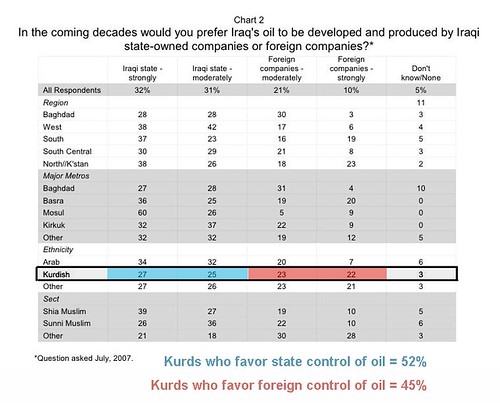The remainder of the story was about wrangling between Baghdad and Kurds, who are more worried about losing their oil income to a central government than to oil companies -- at least according this article. A slightly different perspective on Kurdish opinion follows the article excerpts.
Oddly, the article leaves the impression that the Kurds objections to the Hydrocarbon Law are primarily about being ripped off by the Sunnis and Shia in the central government, but a poll of Iraqis on the main issue of the oil law, foreign versus state control of their oil showed that like the other ethnic groups, Kurds opposed foreign control albeit by a slimmer margin.
EXCERPTS:
Missteps and Mistrust Mark the Push for Legislation
By Joshua Partlow
Washington Post Foreign Service
Wednesday, September 5, 2007; A12
excerpts
"This was a very bad move by the Americans to push for this law," said Issam al-Chalabi, a former oil minister. "Now it looks like . . . the Americans are after oil -- they will bring their Exxons and Chevrons and they will control our oil again."
snip
Meanwhile, bitterness was rising from many factions -- unions in the oil-rich port city of Basra, petroleum industry experts, Sunni politicians and those loyal to Shiite cleric Moqtada al-Sadr -- that the law would allow foreign companies to make off with Iraq's oil wealth. A group of 419 Iraqi academics, engineers and oil industry experts would later sign an open letter to parliament stating that "it is clear that the government is trying to implement one of the demands of the American occupation."
The draft oil law, the letter stated, "lays the foundation for a fresh plundering of Iraq's strategic wealth and its squandering by foreigners, backed by those coveting power in the regions, and by gangs of thieves and pillagers."
snip
The Kurds worried that this central control would limit foreign investment in the oil sector, precluding a rapid boost in oil production and revenue for Iraqis, including themselves. Hawrami wrote after the meeting that the annexes and conference presenters "send a clear message: Iraq is closed for business."
FULL TEXT

This article could be an encouraging sign. Reading the tea leaves, if the DC elite are forced to admit part of the reality opposition to the oil law, it may mean they are about to give up and want to make that capitulation look like a righteous bowing to the will of the Iraqi people rather than a failure to impose order as the childish Bush narrative says.
IRAQ OIL THEFT RESOURCES
 |  |  |

No comments:
Post a Comment